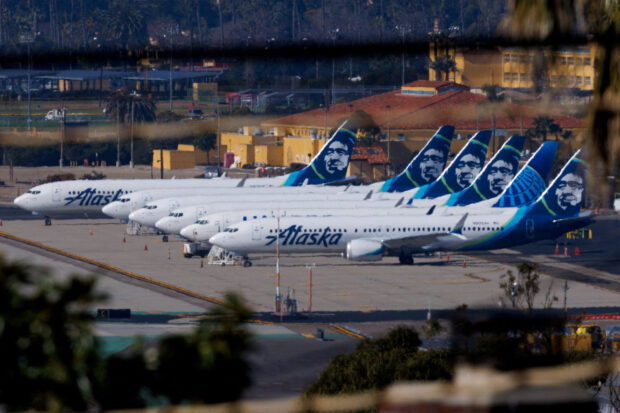Boeing sued by shareholders following MAX 9 blowout

Alaska Airlines commercial airplanes are shown parked off to the side of the airport in San Diego, California, California, U.S. Jan 18, 2024, as the the National Transportation Safety Board continues its investigation of the Boeing 737 MAX 9 aircraft. REUTERS/Mike Blake/File photo
NEW YORK – Boeing has been sued by shareholders who said the company prioritized profit over safety and misled them about its commitment to making safe aircraft, prior to the Jan. 5 mid-air cabin panel blowout on an Alaskan Airlines 737 MAX 9.
According to a proposed class action filed on Tuesday, Boeing spent more than four years after the Oct. 2018 and March 2019 crashes of two other MAX planes, which killed 346 people, assuring investors that it was “laser-focused” on safety and would not sacrifice safety for profit.
Shareholders said Boeing’s statements were false and misleading because they concealed the “poor quality control” on its assembly line, and caused its stock price to be inflated.
READ: Boeing shares take another hit from latest safety problem
Boeing’s share price fell 18.9 percent from Jan. 5 to Jan. 25, 2024, the day after the Federal Aviation Commission barred Boeing from expanding MAX production because of safety concerns. The decline wiped out more than $28 billion of market value.
A Boeing spokesman declined to comment on Wednesday.
No financial targets due to uncertainty
The lawsuit filed in the Alexandria, Virginia, federal court covers shareholders from Oct. 23, 2019 to Jan. 24, 2024, and is led by Rhode Island General Treasurer James Diossa.
READ: Mid-air blowout puts Boeing back in the hot seat
Other defendants include Boeing Chief Executive Dave Calhoun and his predecessor Dennis Muilenburg, and Chief Financial Officer Brian West and his predecessor Gregory Smith.
“This case has the potential to effect changes in Boeing’s practices to protect passengers and ensure their safety in the future,” Diossa said in a statement.
The Jan. 5 blowout caused the FAA to temporarily ground 171 MAX 9 planes, resulting in thousands of flight cancellations at Alaska Air Group and United Airlines.
No one died on the Alaska flight, but some passengers have sued Boeing and the carrier.
On Wednesday, Boeing said it couldn’t provide full-year financial targets because of uncertainty over its planes.
It also reported better-than-expected fourth-quarter results, which included a $30 million loss, $22 billion of revenue and $3.38 billion of cash flow.
The case is State of Rhode Island Office of the General Treasurer v Boeing Co et al, U.S. District Court, Eastern District of Virginia, No. 24-00151.